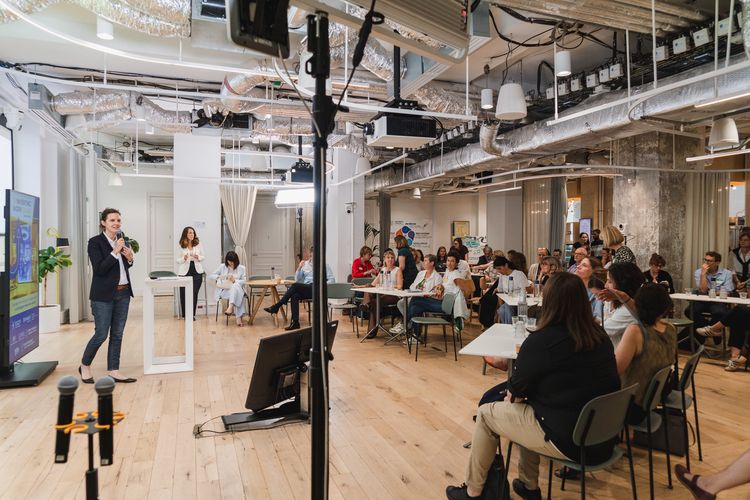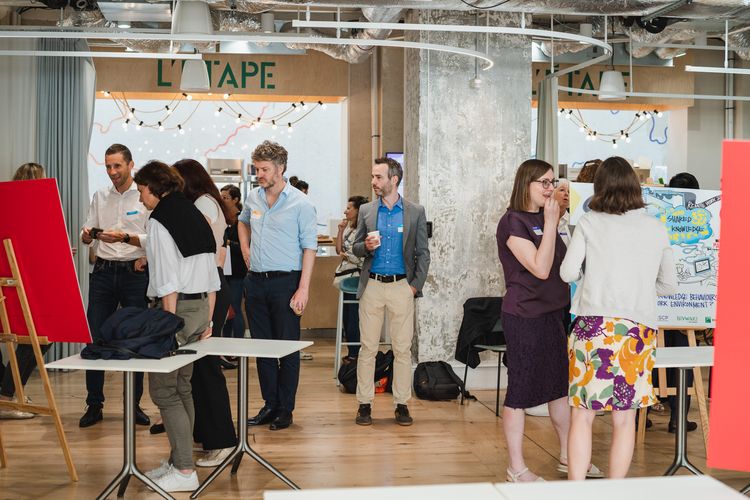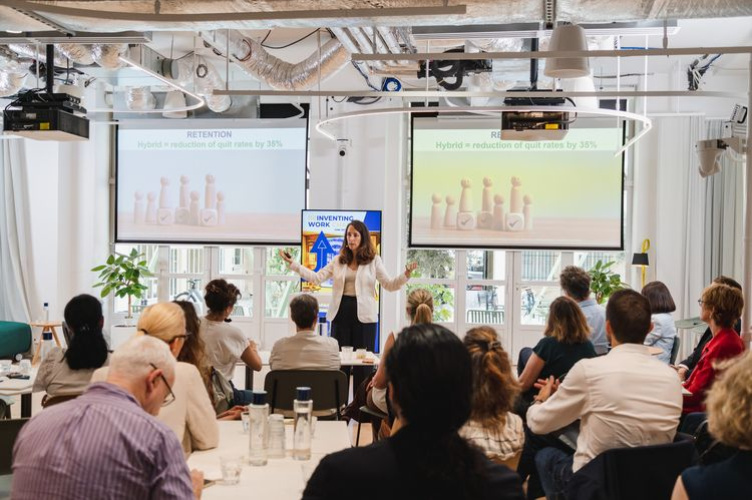What if hybrid work wasn’t a constraint — but a design opportunity? Last month, the Reinventing Work Chair, in partnership with BNP Paribas and BivwAk!, the BNP Paribas Open Innovation Hub, hosted an event at the inspiring BivwAk’s base camp to share the latest insights from five years of research and collaboration. Since its creation, the Chair’s research programme — led by Professor Emmanuelle Léon, Scientific Director and Professor at ESCP — has continuously evolved to address the challenges and opportunities reshaping the world of work.
Over the past five years, the Chair’s research team has launched and refined 17 research projects addressing critical topics such as workplace flexibility, new work environment practices, employee engagement, and leadership. This evolving body of work aims to bring clarity to the profound paradigm shifts driven by digitalisation, hybrid work, generational expectations, and the growing demand for meaning at work.

During the event, Professor Emmanuelle Léon delivered a keynote titled “Hybrid Collaboration: Shape It, Don’t Survive It”. Drawing on robust qualitative and quantitative research, she shared some key findings on how organisations can move beyond surviving hybrid work and actively design it to boost performance, engagement, and well-being.
Hybrid Work: Productivity and Retention Realities
One highlight of the keynote was a closer look at the real impact of hybrid work:
• Research shows little difference in productivity between fully on-site and hybrid models, but fully remote setups in the US are linked to productivity drops.
• For employees, hybrid work holds significant value — equating to an 8% pay increase — making it a powerful tool for retention.
• Rather than enforcing a return to the office, organisations should focus on balancing individual needs, synchronicity, and asynchronicity in work design.
Modern Work Organisation: Hidden Costs
The research also shed light on the hidden costs of modern work:
• Many employees continue to check emails after hours, face constant interruptions, and spend more time in meetings than in focused work.
• This overload hampers creativity, productivity, and engagement — key factors that must be addressed to unlock the full potential of hybrid work.
Rethinking Return-to-Office Mandates
The data challenges the idea that mandatory office returns are a solution:
• Forcing employees back often raises resignations without delivering productivity gains.
• Remote work does not create problems; it exposes existing ones that companies must tackle to improve the work experience sustainably.
Evolving Dynamics: Globalisation and Psychological Contracts
Professor Léon’s work highlights broader shifts in workplace dynamics:
• Globalisation demands new structures and greater international collaboration.
• Traditional psychological contracts built on loyalty and job security are giving way to expectations of employability and continuous career development.
• To thrive, organisations must adapt hybrid collaboration models to move beyond outdated industrial-age approaches.
Re-engineering Collaboration
Today’s teams face a paradox: meetings were supposed to replace emails, yet people now multitask in meetings to catch up on emails — leading to even more meetings.
• Overlapping meetings and constant context-switching drain focus.
• The research also highlighted a gender bias: men often excel in informational and social resources, while women tend to outperform in personal resources — underscoring the need for more inclusive collaboration design.
Improving Collaboration and Psychological Safety
Key tips emerged to help teams collaborate better:
• Document processes, share expertise openly, and encourage people to express which skills they want to develop.
• Build a culture of psychological safety, where people feel comfortable asking questions, admitting mistakes, and suggesting new ideas.
The Role of AI in Hybrid Work
Artificial intelligence is also part of the picture:
• AI is well-suited to support remote work by handling repetitive tasks and aiding with writing, but it needs social context to be truly useful.
• While AI alone won’t solve hybrid work challenges, it can catalyse better human collaboration when used thoughtfully.
Structuring Hybrid Work for the Future
Making hybrid work sustainable means setting clear structures:
• Clear schedules and explicit cooperation rules are essential to maintain innovation and creativity.
• Organisations must ensure that projects deliver not just economic value, but also mastery and purpose for individuals.
The Road Ahead: Collaborative Intelligence
Finally, Professor Emmanuelle Léon emphasised that the future of work depends on developing collaborative intelligence by blending network science, data science, and management science. The Chair’s next research cycles will continue to tackle complex topics such as virtual onboarding, cultural intelligence, knowledge sharing, artificial intelligence and flexible work structures.

As work keeps evolving, one message is clear: companies must not just adapt to change — they must actively shape it and build organisations that are more resilient, engaging, and truly human.
Campuses
